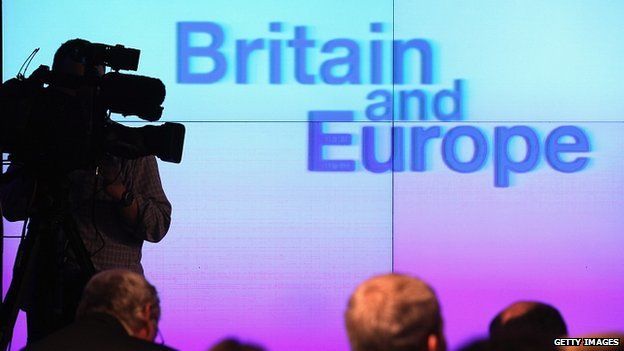EU holds its breath ahead of UK vote
- Published
- comments

Have you ever been at a social gathering where you suddenly throw out a question that leads to an uncomfortably long silence?
You know, everyone turns away from you, looking rather awkward, and then tries to change the subject?
It's a bit like that in Brussels when you ask people their opinion on the British election.
Why is that?
Well, as one German politician put it to me: "The real divide as we see it in the UK, is not between Labour and the Conservatives, it's between the UK and Europe."
This week's vote is seen in mainland Europe as a Brexit barometer. An indication as to how likely - or not- it might be that Britain will choose to exit the EU.
The majority of Britain's EU partners want it to stay and so - as an article in France's influential Le Monde put it last weekend - Brussels has been treading carefully these last weeks not to focus on issues that might "annoy" the UK.
Hence the reluctance to discuss this week's election in too much detail.
While Europe has barely featured in the election campaigns in Britain - with the exception of Ukip which managed to link the issues of the EU and immigration - here in Brussels the UK vote is being scrutinised to an unprecedented extent.
David Cameron has promised to hold a referendum on Britain's membership of the EU by 2017 if the Conservative Party is returned to government. Labour hasn't ruled out a referendum at some point and many EU civil servants believe the public mistrust of Brussels to be so high in Britain, they assume there'll be a demand for some kind of EU vote.
But the tone surrounding a possible referendum and its timing is thought here to depend very much on which party or parties form the next British government.
"Europe is watching," Sophie in 't Veld, vice-chair of the Alliance of Liberals and Democrats for Europe, told me.
"People here realise that national elections have implications for the course of the European Union. Everyone is sure this UK election will somehow lead to a referendum and I hope Britain has not given up on the EU. The EU has certainly not given up on Britain."
The unpredictable nature of this UK election and the possibility of it resulting in a minority government also worries some of Britain's European partners.
"Anything that weakens the UK also weakens Europe and weakens Nato," Jacek Rostowski, adviser to the Polish prime minister, told the Financial Times newspaper.
Eastern European governments applaud the UK's current tough stance on Russian sanctions. They fear anything that may dilute it.
In fact, despite well-known frustration in Europe at Britain often asking to be an exception to EU policies and regulations - in the case of the euro, Schengen border controls, the social chapter, the charter on fundamental rights, and police and justice co-operation which EU officials dismissively describe as the UK's "pick and mix attitude" towards the EU - Britain is hugely appreciated in a number of ways.
Balance of power
Germany's Angela Merkel, the EU's most influential leader, has called for the UK to stay in the EU.
One of the main reasons from her point of view would be to keep a balance of power amongst EU heads of state and government.
Right now, protectionist, interventionist nations and pro-free market countries like the UK and Germany, are pretty evenly matched. Germany does not want to be outnumbered.
Nor does it want to have to empty its pockets even further. If Britain leaves, it would be mostly German taxpayers, as the largest net contributors, making up the shortfall to the EU budget.
Britain is also often praised in EU circles for "asking the hard but necessary questions" as a close aide to Chancellor Merkel put it to me. Such as cutting EU red tape and increasing competitiveness.
Concern and interest in this Thursday's election even stretches across the Atlantic.
The US does not want the UK to leave the European Union.
It views the UK as a strategic ally on the inside, not just on trade issues but as a country still with a decent military capacity that can potentially influence EU foreign policy.
However, Brussels diplomats point to what is seen as an increasingly isolationist Britain. Where was the UK in the Minsk ceasefire discussions with Russia, for example?
Still, Mark Leonard, Director of the European Council on Foreign Relations, told me that Europe without the UK would be smaller, weaker and less balanced and so it would go to "long lengths" to keep it in.
Will that include changes to EU founding treaties, technical amendments to treaties or tweaks to existing EU legislation?
David McAllister, an MEP for Angela Merkel's CDU party, spoke for many in Brussels when he told me there was no point talking about red lines - about what can or can't be done for the UK - until a new government has been formed and concrete proposals or requests are put to Brussels and the other 27 EU members.
The guardian of the EU treaties - EU Commission President Jean Claude Juncker - says one of his top priorities is to get a "fair deal" for Britain.
When polling stations open in the UK, Brussels will be holding its breath.
- Published28 April 2015
- Published27 April 2015
- Published3 March 2016